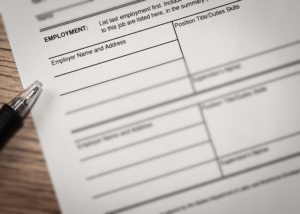By Drew M. Smith
 On October 12th, California governor Jerry Brown signed a new statewide salary privacy bill. This bill, A.B 168, adds a new chapter to the California employment code. On January 1st, 2018, the box that indicated that employers were allowed to run a background check will be removed from all applications in the state. This law makes it illegal to request an applicant’s job and salary history and then use it to deny a job based on the information found. In addition, unless the applicant volunteers the information, they cannot use the salary information to set an employee’s wage.1
On October 12th, California governor Jerry Brown signed a new statewide salary privacy bill. This bill, A.B 168, adds a new chapter to the California employment code. On January 1st, 2018, the box that indicated that employers were allowed to run a background check will be removed from all applications in the state. This law makes it illegal to request an applicant’s job and salary history and then use it to deny a job based on the information found. In addition, unless the applicant volunteers the information, they cannot use the salary information to set an employee’s wage.1
According to federal regulation, “Any background information you receive from any source must not be used to discriminate in violation of federal law. This means that you should:
- Apply the same standards to everyone, regardless of their race, national origin, color, sex, religion, disability, genetic information (including family medical history), or age (40 or older). For example, if you don't reject applicants of one ethnicity with certain financial histories or criminal records, you can't reject applicants of other ethnicity because they have the same or similar financial histories or criminal records.
- Take special care when basing employment decisions on background problems that may be more common among people of a certain race, color, national origin, sex, or religion; among people who have a disability; or among people age 40 or older. For example, employers should not use a policy or practice that excludes people with certain criminal records if the policy or practice significantly disadvantages individuals of a particular race, national origin, or another protected characteristic, and does not accurately predict who will be a responsible, reliable, or safe employee. In legal terms, the policy or practice has a "disparate impact" and is not "job related and consistent with business necessity."2
While this is, in theory, a good way to make more applicants available for a job, some economists believe that such policies have an opposite effect. They believe employers would engage in statistical discrimination. This discrimination occurs, when instead of using background checks to determine if an applicant, they go with the groups less likely to commit crimes. One study from Princeton economist Amanda Y. again conducted a blind study where she sent fake applications to employers with and without the box on the application. The study showed that in applications with the box, blacks received near equal amount of callbacks, about 7% less than whites. Without the box, that disparity shoots up to 45% less callbacks than whites.3
Background checks are in place to find the right person to work with your staff. Doing it correctly means you pick them without discrimination and with a relatively clean record. But in areas where having this box is illegal, it’s hard to do so without leaving out groups of qualified people. Follow the correct laws for the jurisdiction you are in. Protect yourself with EPLI insurance in case you are inadvertently discriminate.
To find out more about an EPLI policy tailored for your business, contact Axis Insurance Services, LLC today.
1https://www.jdsupra.com/post/documentViewer.aspx?fid=90134690-1464-445e-ad6a-3af1a7a9cc28
2https://www.eeoc.gov/eeoc/publications/background_checks_employers.cfm
3https://papers.ssrn.com/sol3/papers.cfm?abstract_id=2795795

